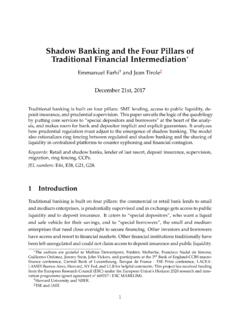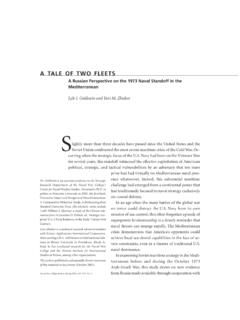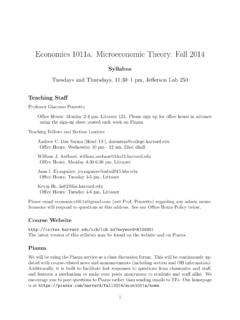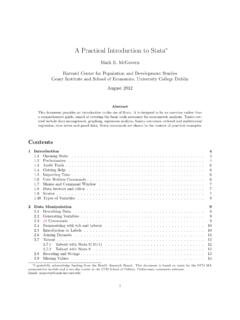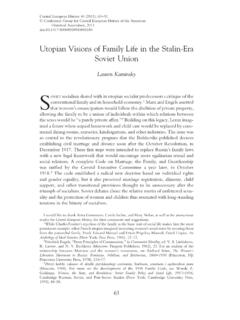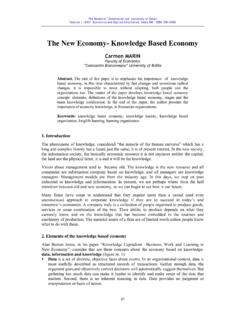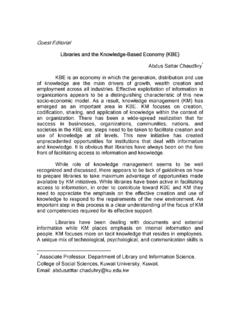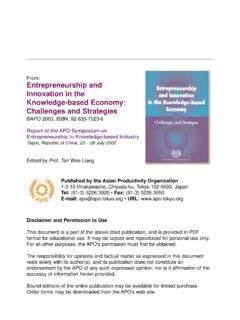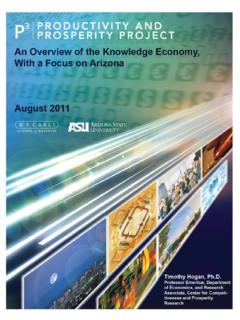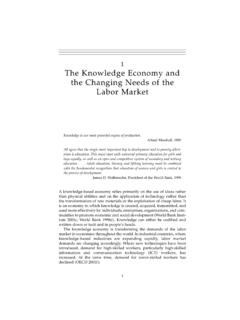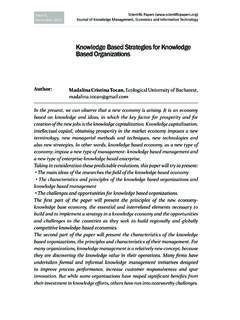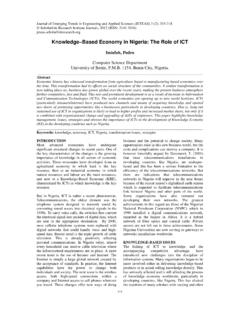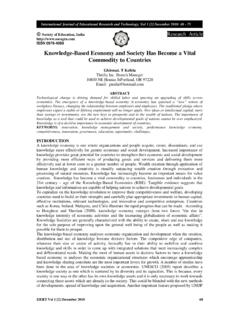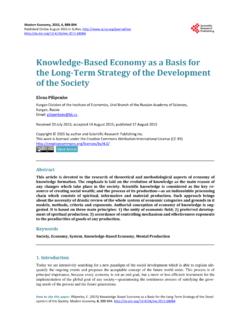Transcription of THE KNOWLEDGE ECONOMY - Home | Scholars at Harvard
1 11 Jun 2004 16:51 AR LaTeX2e(2002/01/18) P1: IBC. Annu. Rev. Sociol. 2004. 30:199 220. doi: Copyright c 2004 by Annual Reviews. All rights reserved First published online as a Review in Advance on February 20, 2004. THE KNOWLEDGE ECONOMY . Walter W. Powell1,2,3 and Kaisa Snellman2. 1. School of Education and 2 Department of Sociology, Stanford University, Stanford, California 94305; 3 Santa Fe Institute, Santa Fe, New Mexico 87501;. email: Annu. Rev. Sociol. :199-220. Downloaded from by Stanford Univ. Robert Crown law Lib. on 06/01/06. For personal use only. Key Words KNOWLEDGE , productivity, workplace reform, distributional effects of technological change Abstract We define the KNOWLEDGE ECONOMY as production and services based on KNOWLEDGE -intensive activities that contribute to an accelerated pace of technical and scientific advance, as well as rapid obsolescence.
2 The key component of a KNOWLEDGE ECONOMY is a greater reliance on intellectual capabilities than on physical inputs or natural resources. We provide evidence drawn from patent data to document an upsurge in KNOWLEDGE production and show that this expansion is driven by the emergence of new industries. We then review the contentious literature that assesses whether recent technological advances have raised productivity. We examine the debate over whether new forms of work that embody technological change have generated more worker autonomy or greater managerial control. Finally, we assess the distributional consequences of a KNOWLEDGE - based ECONOMY with respect to growing inequality in wages and high-quality jobs.
3 INTRODUCTION. Over the past several decades, a number of Scholars and commentators have ar- gued that the leading edge of the ECONOMY in developed countries has become driven by technologies based on KNOWLEDGE and information production and dis- semination. These new technologies which emerged in the late 1950s, expanded with the proliferation of personal computers, and then surged dramatically with the widespread use of email and the Internet have considerable potential to re- make the nature of work and the ECONOMY . Nevertheless, our understanding of the purported KNOWLEDGE ECONOMY remains rather hazy, clouded by both enthusiasts and doomsayers who are quick to offer labels and assessments without much at- tention to evidence.
4 Still others see a growth industry in providing professional services to organizations and nations to assist them in the transition to KNOWLEDGE - intensive modes of production. If the KNOWLEDGE ECONOMY is measured by the rise in KNOWLEDGE management services among consulting firms or by the rapid growth in intellectual property as a legal specialty, then its growth has been considerable. Critics, however, argue that much of the growth is precisely in selling information 0360-0572/04/0811-0199$ 199. 11 Jun 2004 16:51 AR LaTeX2e(2002/01/18) P1: IBC. 200 POWELL SNELLMAN. technology and related services. Our aim in this chapter is to sort through these debates and provide an overview of the scholarly literature in the social sciences on the KNOWLEDGE - based ECONOMY .
5 We present evidence for the acceleration in KNOWLEDGE production and discuss the key issues that have been addressed by the empirical literature. The broad label KNOWLEDGE ECONOMY covers a wide array of activities and interpretations. At least three lines of research fall under this umbrella. The oldest approach, with its origins dating back to the early 1960s, focuses on the rise of new science- based industries and their role in social and economic change. Some analysts include professional services and other information-rich industries Annu. Rev. Sociol. :199-220. Downloaded from such as publishing in this category, noting the marked growth in employment in these sectors of the ECONOMY over the past three decades (Machlup 1962, Porat by Stanford Univ.)
6 Robert Crown law Lib. on 06/01/06. For personal use only. 1977, Stanback 1979, Noyelle 1990). A core idea unifying this strand of work is the centrality of theoretical KNOWLEDGE as a source of innovation (Bell 1973). With some stretching, the new growth theory in economics (Romer 1986, 1990). could be included here as this work stresses the importance of KNOWLEDGE in economic growth, noting that discoveries differ from other inputs because they are nonrivalrous and fuel further innovation. There has been a good deal of debate in the economics field over whether partic- ular industries are especially KNOWLEDGE -intensive. Much effort has gone into ana- lyzing how much these sectors contribute to growth in productivity (Brynjolfsson & Hitt 2000, Gordon 2000).
7 Because the expansion of KNOWLEDGE -intensive in- dustries and the accompanying productivity increase occurred in the context of unusual macroeconomic and financial-market developments in the 1990s, a good deal of popular literature asserted that the KNOWLEDGE ECONOMY operated differently from the past in some fundamental way. Although few Scholars now accept such claims, much recent research in sociology and labor economics has focused on whether new kinds of jobs and novel forms of work organization have emerged in recent years. The degree to which new modes of work are particularly tethered to the KNOWLEDGE ECONOMY is not altogether clear, and just how different these work arrangements are from older ones is the subject of much debate (Kochan & Barley 1999).
8 A third strand of work is much more narrow and managerial in orientation, focusing on the role of learning and continuous innovation inside firms (Drucker 1993, Nonaka & Takeuchi 1995, Prusak 1997). Some organizations appear to be particularly good at KNOWLEDGE production and transfer, and researchers are inter- ested in understanding why and whether these practices can be replicated. Such inquiry is potentially widely applicable, but the core concern of this line of work has been more applied. The broader sociological and economic implications con- cerning whether KNOWLEDGE is codified or tacit, and what kinds of social arrange- ments enhance or impede KNOWLEDGE generation and transmission have recently begun to attract attention (Cowan et al.)
9 2000). Still, systematic empirical research on this topic is scarce and has not dealt with its implications for employment practices. 11 Jun 2004 16:51 AR LaTeX2e(2002/01/18) P1: IBC. THE KNOWLEDGE ECONOMY 201. We define the KNOWLEDGE ECONOMY as production and services based on KNOWLEDGE -intensive activities that contribute to an accelerated pace of techno- logical and scientific advance as well as equally rapid obsolescence. The key components of a KNOWLEDGE ECONOMY include a greater reliance on intellectual capabilities than on physical inputs or natural resources, combined with efforts to integrate improvements in every stage of the production process, from the R&D.
10 Lab to the factory floor to the interface with customers. These changes are reflected in the increasing relative share of the gross domestic product that is attributable to intangible capital (Abramovitz & David 1996). Of course, many alternative labels and definitions are more expansive than ours, but we choose to keep the Annu. Rev. Sociol. :199-220. Downloaded from focus on the production of novel ideas that subsequently lead to new or improved goods and services and organizational practices. by Stanford Univ. Robert Crown law Lib. on 06/01/06. For personal use only. We begin with a review of the evidence in support of the argument that key sec- tors of the ECONOMY are more reliant on KNOWLEDGE generation and dissemination today than they were in the past.


